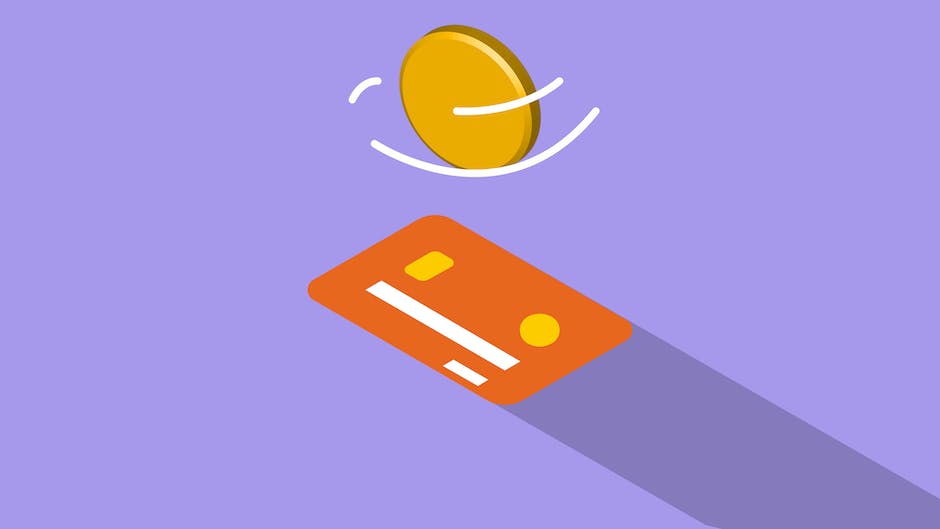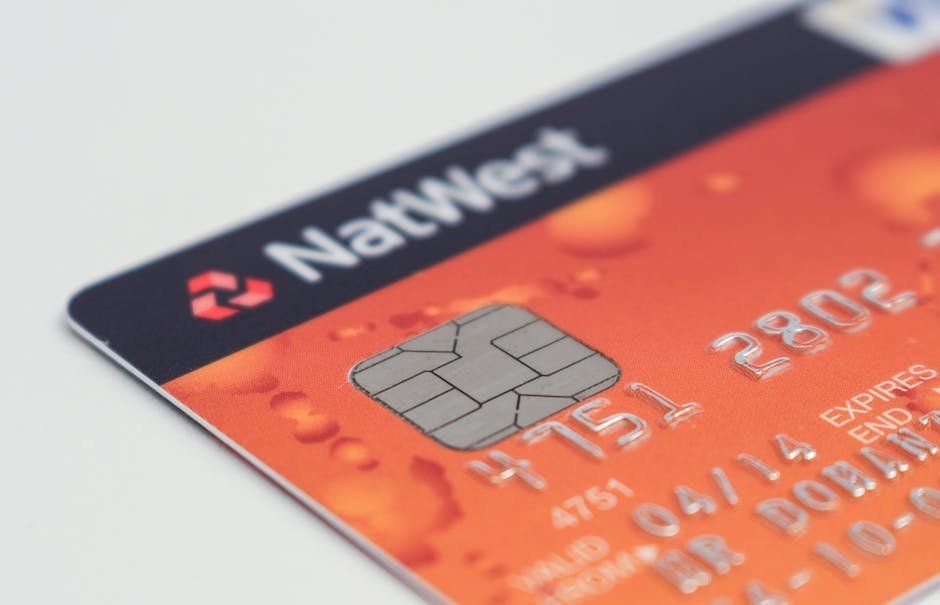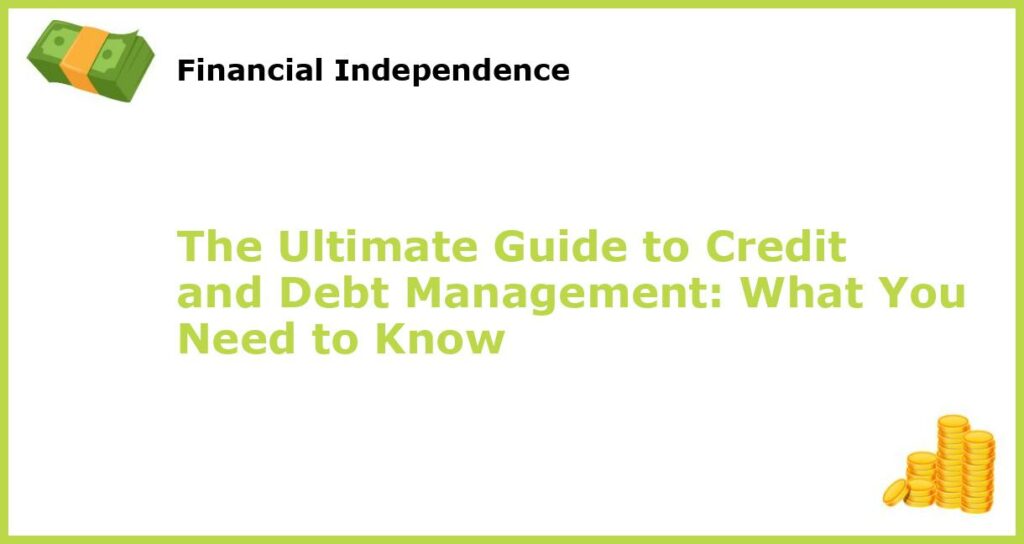Are you tired of being confused about credit and debt management? Do you want to take control of your finances and achieve financial freedom? Then this is the ultimate guide for you! In this article, we will cover all the essential topics you need to know regarding credit and debt management, from understanding credit to working with credit counselors. Let’s dive in!
Understanding Credit

Credit is a financial tool that can be beneficial if used responsibly. It allows you to borrow money that you promise to pay back in the future. Credit is available in many forms, such as credit cards, loans, and lines of credit. However, not all credit is created equal. Some forms of credit may offer lower interest rates, fees, and rewards than others. Therefore, before applying for credit, it is essential to do your research and find the best option for your financial situation.
Moreover, when you apply for credit, your lender will examine your credit history and credit score to determine your creditworthiness. Credit history is a record of your financial behavior, such as your payment history, current debt, and credit utilization ratio. On the other hand, the credit score is a three-digit number that summarizes your creditworthiness. A higher credit score indicates that you are more likely to repay your debt on time and can result in better terms and interest rates.
In summary, understanding your credit options and keeping your credit history and score in good shape can help you achieve your financial goals and avoid debt traps.
Managing Credit Responsibly

Once you have credit, managing it responsibly is crucial to your financial wellbeing. To do so, you need to make your payments on time, pay off your balances in full, and maintain a low credit utilization ratio. Late payments can hurt your credit score and result in fees and penalties. Paying off your balances in full can save you money on interest charges and improve your credit utilization ratio, which is the amount of credit you are currently using compared to your total credit limit.
Moreover, you should regularly check your credit report for errors and review your credit score to ensure that you are on the right track. Errors on your credit report can harm your credit score and result in higher interest rates and fees. Therefore, it is essential to monitor your credit report and dispute any errors that you find. Additionally, reviewing your credit score can help you identify areas that need improvement and motivate you to continue managing your credit responsibly.
In conclusion, managing credit responsibly can help you build and maintain a good credit history and score, which can save you money and open up more financial opportunities.
The Importance of Debt Management

Debt management is the process of managing your debt to ensure that you can repay your debt without hurting your credit score or your financial health. Debt management involves developing a budget and sticking to it, paying off your debt as quickly as possible, and avoiding new debt. Without proper debt management, you may struggle to meet your financial obligations, fall behind on payments, and damage your credit score and financial wellbeing.
Furthermore, debt comes in many forms, including secured debt, unsecured debt, revolving debt, and installment debt. Understanding the differences between these types of debt can help you manage your debt more effectively and develop a plan to pay off your debt. For example, revolving debt, such as credit cards, typically has higher interest rates and fees than installment debt, such as a personal loan. Therefore, paying off your revolving debt should be a priority if you want to save money and improve your credit score.
Conclusively, debt management is essential for your financial health and can help you avoid financial stress and hardship by creating a path towards financial freedom and security.
Types of Debt

As mentioned earlier, there are several types of debt, and understanding the differences between these types of debt can help you manage your debt more efficiently. Secured debt is debt that is backed by collateral, such as a mortgage or car loan. Unsecured debt, on the other hand, is debt that is not secured by collateral, such as credit cards or personal loans. Revolving debt is debt that can be used repeatedly, such as a credit card balance, and usually has higher interest rates and fees than installment debt, which is a fixed loan that is repaid in installments, such as a student loan or car loan.
Understanding the nuances between types of debt can help you prioritize your payments and pay off high-interest debt first, which can save you money and improve your credit score. It is also essential to avoid taking on new debt unless it is necessary and you can afford the payments.
How to Get Out of Debt

If you are struggling with debt, don’t worry; there are several strategies that you can use to get out of debt. One of the most popular methods is the debt snowball method, in which you prioritize paying off your smallest debt first while continuing to make the minimum payments on your other debts. Once you have paid off your smallest debt, you move on to your next smallest debt and continue the process until all of your debts are paid off.
Another approach is the debt avalanche method, which prioritizes paying off high-interest debt first while continuing to make the minimum payments on your other debts. This method can save you more money in interest charges, but it may not provide as quick of a win as the debt snowball method. Additionally, debt consolidation, which involves combining multiple debts into one loan with a lower interest rate, can also be an effective way to manage debt and save money on interest charges.
No matter which method you choose, the key is to stick to it and make consistent payments. Getting out of debt may take time and effort, but the payoff is financial freedom and security.
Building and Rebuilding Credit

If you have poor credit or no credit, don’t worry; there are several steps that you can take to build or rebuild your credit. One of the best ways to build credit is to make on-time payments on your credit accounts, such as credit cards and loans. Late payments can harm your credit score and set you back in your credit-building journey.
Additionally, keeping your credit utilization low, which is the amount of credit you are currently using compared to your total credit limit, can also help improve your credit score. Aim to keep your credit utilization below 30% to have a positive impact on your credit score.
If you don’t have a credit history or have a poor credit history, applying for a secured credit card or a credit-builder loan can also be a helpful way to build credit. Secured credit cards require a security deposit but can help you establish credit if used responsibly. Credit-builder loans are a type of installment loan that helps you build credit by making small payments over time.
Building or rebuilding credit may take time and patience, but it is worth it in the long run to achieve financial freedom and security.
Protecting Yourself from Identity Theft

Identity theft is a serious crime that can wreak havoc on your credit score and your finances. To protect yourself from identity theft, you should monitor your credit reports regularly, avoid sharing personal information online, and shred any documents that contain sensitive information.
Monitoring your credit report can help you catch any suspicious activities or accounts that may indicate identity theft. Additionally, avoid sharing personal information, such as your social security number or bank account number, online or over the phone, and be wary of phishing scams that may try to steal your personal information. Lastly, shred any documents that contain sensitive information before disposing of them to prevent someone else from accessing them.
By taking steps to protect yourself from identity theft, you can avoid financial stress and hardship and maintain your financial wellbeing.
Avoiding Credit Repair Scams

There are many credit repair scams that promise to fix your credit quickly and easily. However, many of these scams are illegitimate and can actually make your credit score worse. To avoid credit repair scams, do your research, read reviews, and ask for referrals from trusted sources.
Legitimate credit repair companies can help you dispute errors on your credit report or negotiate with your creditors to remove negative information from your credit report. However, they cannot legally remove accurate information from your credit report, and their services may come at a cost. Therefore, it is essential to research any credit repair company thoroughly before paying for their services.
Working with Credit Counselors
If you are struggling with debt or credit issues, working with a credit counselor can be a great option. Credit counselors can help you develop a budget, negotiate with your creditors, and develop a plan to get out of debt. However, it is important to choose a reputable and trustworthy credit counseling agency.
Legitimate credit counseling agencies are non-profit organizations that are accredited by reputable organizations, such as the National Foundation for Credit Counseling. Furthermore, they should provide their services for free or at a low-cost and disclose their fees upfront. Lastly, they should provide counseling that is tailored to your specific financial situation and needs.
Working with a credit counselor can be an effective way to manage debt and achieve financial freedom and security, but it is essential to do your research and choose a reputable agency.
Conclusion
Credit and debt management can seem overwhelming, but by understanding different types of credit and debt, developing a budget, and sticking to a plan, you can achieve financial freedom and security. Managing credit responsibly, prioritizing debt management, and protecting yourself from identity theft and scams are essential steps to take towards financial wellbeing. Moreover, seeking help from credit counselors and other resources can also be beneficial in difficult times. Remember, achieving financial freedom is a journey, not a destination, and starting today can make all the difference in your financial future.







